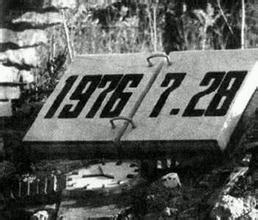(单词翻译:单击)
Even though Yang Zhensheng has no memories of his own of the earthquake that flattened his hometown shortly before his birth, the disaster will forever be part of his life -- he is named after it.
对于1976年唐山大地震,杨震生并没有太多的印象--他是在地震后不久出生的,然而,他的身上却有地震抹不去的印记,伴随他的一生--他的名字就是因地震而来。
In his given name, "zhen" means earthquake and "sheng" means birth. He was the first baby born in the rubble of Tangshan, after the 7.8-magnitude event which claimed more than 242,000 lives on July 28, 1976.
他的名字,“震”即是地震,“生”是出生。1976年7月28日,唐山发生7.8级大地震,约有24.2万人丧生,他是在震后唐山的废墟上出生的第一个婴儿。唐山处。
Chinese parents commonly mark historical events in the names of their children, and many of those who will soon turn 40 have the Chinese character "zhen" in their given names. Zhensheng and Kangzhen (quake resistant) are among the most common.
中国父母通常喜欢以历史事件为孩子取名。许多名字中带有“震”的孩子们,马上就要40岁了。“震生”、“抗震”是地震婴儿最普遍的名字。
"We didn't experience the horror ourselves, but it left a permanent mark on us," Yang said.
杨震生说,“我们并未亲历这场灾难,但它却给我们留下了永远的印记。”

Perhaps due to his link to the disaster, after graduation Yang went to work in the local civil affairs bureau, the department in charge of disaster relief, and has been head of the Tangshan sanatorium for paraplegia for 11 years.
也许正是由于他与地震的渊源,大学毕业后,杨震生就到当地的民政局负责灾难救援工作。他担任唐山市截瘫疗养院院长已经11年了。
The powerful earthquake 40 years ago left 3,817 survivors paraplegic, more than 800 of whom are still alive. In the sanatorium, patients receive free treatment, food and accommodation, as well as living allowance. "Born the day of the tragedy. I'm happy to care for them," Yang said.
40年前的这场大地震导致3817人截瘫,如今有800多人尚生活在疗养院。他们的治疗、吃住费用全免,每个人每月都有补贴。杨震生说,“作为地震后出生的婴儿,能够照顾这些不幸的长辈们,我很乐意。”
At noon on Aug. 4, Yu Fengrong gave birth to a daughter in a temporary shack, not long after she was pulled from the debris. She still remembers her misery as, without even the most basic necessities, she held her baby and wept as rain poured through the roof. The desperate mother felt a small measure of relief to see soldiers arrive with hot porridge and boiled eggs -- the traditional food for new Chinese mothers.
那年的8月4日中午,被人从废墟中救出来不久的于凤荣,在临时搭建的一个窝棚里生出了一个女孩。她还记得当时的悲惨境遇,连最基本的生活保障都没有,她抱着孩子,坐在漏雨的棚子里,暗自落泪。而解放军战士送来的热气腾腾的大米粥和鸡蛋--产妇所需要的传统补品--让她有了些许安慰。
For the next month, the soldiers helped the family through their hardest of times, visiting them nearly every day with milk powder, noodles and anything else they could find. Yu Fengrong and her husband Yu Zhanshui showed their gratitude to their saviors in the name of their daughter, Yu Shuiqing.
随后一个月里,部队官兵几乎天天来看望,送来宝贵的奶粉、挂面和其他必需品,让产妇和孩子度过了最艰难的时光。为了感谢救命恩人,于凤荣和丈夫于占水为女儿取名于水情。
The pronunciation of her name is the same as the Chinese idiom to mean literally "the affection between fish and water," which is usually used to describe the rapport between the military and civilians.
于水情这个名字的读音和中国的一个习语“鱼水情”相同,常常用来表达解放军和百姓之间的亲密关系。
Also on Aug.4, Sun Hu was delivered in a tent without water or electricity by Dr. Zhou Juanhua, a member of a rescue team sent by a Shanghai hospital.
同样是在那年的8月4日,在没水没电的情况下,孙沪出生了,是上海一个医院救援队的产科医生周娟华为其接生的。
Sun's mother had a difficult labor, and Zhou knelt on the ground for seven hours to deliver the baby. Sun was given the name "Hu," the abbreviation for Shanghai, the commercial and financial hub on the east China coast, to express admiration for the woman doctor.
孙沪的妈妈难产,周娟华整整在地上跪了7个小时才成功接生了这个婴儿。为了感谢上海的周医生,她的父母为其取了“沪”这个名字。沪是上海这个东部沿海商业、金融中心的简称。
The children of the Tangshan earthquake, born among the rubble and squalor, have been taught the true meaning of gratitude by their parents.
唐山地震时期在废墟中出生的孩子,已经从父母那里学会了感恩的真正含义。
Following the catastrophic Wenchuan earthquake in southwest China's Sichuan Province in 2008, more than 270 Tangshan people named Zhensheng or Kangzhen together visited the Tangshan quake monument in downtown Tangshan, Hebei Province, and made donations for the victims in Sichuan.
2008年中国西南部四川省汶川发生特大地震,270多名名叫'震生'、'抗震'的当年唐山的地震婴儿,怀着感恩的心情,集体来到位于河北省唐山市的抗震纪念碑前,给灾区捐款。
"We can't just sit idly by. It was only through the kindness of people all over the country that we are alive today," Yang said.
杨震生表示:“我们不能坐视不管。正是因为全国人民的恩情,我们才能活到今天。”


